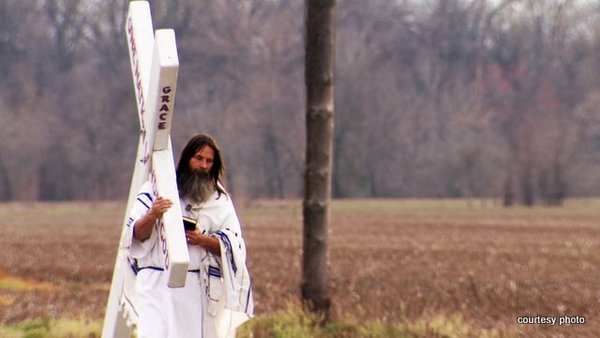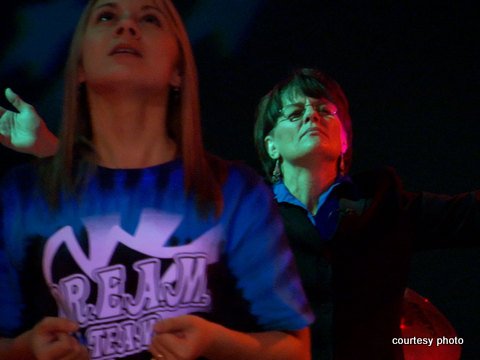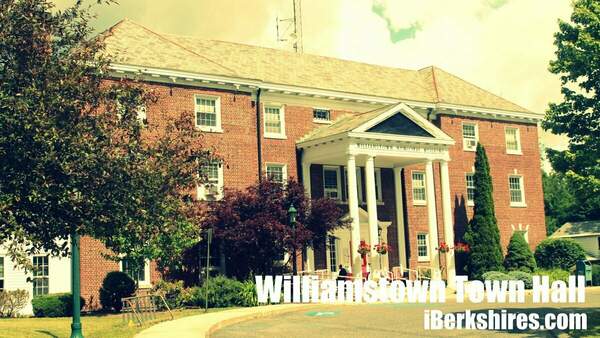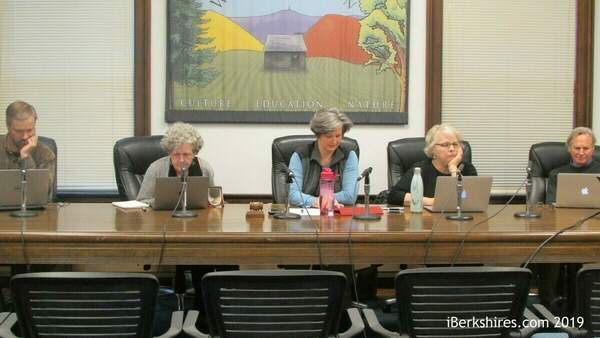
Williamstown Artist Takes Film to Louisiana
 Mitsi Taylor leads her church's children's choir in a scene from 'Good People Go to Hell, Saved People Go to Heaven.' Mitsi Taylor leads her church's children's choir in a scene from 'Good People Go to Hell, Saved People Go to Heaven.' |
WILLIAMSTOWN, Mass. — Holly Hardman did not set out to make a film that lampoons or attacks the evangelical Christian movement.
And, despite its provocative title, her new documentary does neither.
What it does do is provide a look into the lives of everyday Americans who help make up a group that is, by one estimate, 90- to 100-million strong.
"Good People Go to Hell, Saved People Go to Heaven" is the first feature-length documentary by the Williamstown filmmaker.
The film makes its U.S. debut this weekend at the Louisiana International Film Festival. It made its world debut last year as an official selection at the 25th annual International Documentary Film Festival Amsterdam in the Netherlands.
"Good People" takes its title from the words of a preacher captured by Hardman and her crew at a rally in New Orleans.
It is clear in talking to Hardman that she has concerns about that kind of strident message prevalent in the evangelical community, which the Wheaton College-based Institute for the Study of American Evangelicals estimates to be as much as 35 percent of the U.S. population.
But while she freely discusses opinions she formed after years of studying the born-again movement, Hardman's film is not a polemic. It is a thoughtful and, at times, intimate portrait of individual evangelicals — principally a Louisiana family and a Minnesota itinerant preacher — as they cope with a natural disaster, Hurricane Katrina, that they see as evidence the end of the world is approaching.
While Hardman may not share their views, it is clear she cares about them as people.
On a recent spring morning, Hardman sat on a bench on Spring Street and talked about those people and the film they inspired.
QUESTION: How did you get interested in this topic?
HARDMAN: I was at the Berkshire Conference (in 2004), and artists were talking about the Patriot Act. ... They all felt threatened and choked by this crazy Patriot Act. I walked away and ... I just felt as though I have the knowledge of filmmaking, and I think I have to put it to better use. I thought I had to make a documentary that has something to do with contemporary political America.
That did end up leading me to religion because I wanted to know why George Bush was being elected. I did not understand. Who were the groups who were voting for him, besides the regular GOPers? And then I started reading about the evangelical Christians who put him over the top.
I said, 'I think I know what Christianity is.' I was always taught in a Judeo-Christian society that embraced all these other faiths that came into our open society. Well, ha-ha-ha. I started reading about evangelicals and their desire not to have such an open society. From there, I became fascinated with the belief in the End Times and the Rapture. That's how this came about.
Q: And how did it end up?
HARDMAN: It went from being this film that I thought would have an obvious political agenda to something quite different. It became, I think, an ethnographic piece about this American culture, the Rapture culture, that is very much caught up in a belief about the end of the world and the Apocalypse.
Q: It's not pushing a position as much as it is a study?
HARDMAN: Yes, it's anthropological. And if you watch it, you'll see that quietly, it's unavoidable, just by my choice of using certain information, I am making a statement. Just by allowing some of the people to say things that I think are dangerous, a little frightening -- that's a comment right there. I certainly wasn't censoring them.
It's all in their words. I want to know what they think. I think that's what this film does. It allows us to understand what makes them tick, why they believe what they do and what it is that they believe. And then it's up to the audience to decide what to do with this information that was given to them in as objective a manner as I could.
 Williamstown filmmaker Holly Hardman spent five years making a documentary about evangelism. Williamstown filmmaker Holly Hardman spent five years making a documentary about evangelism. |
Q: Have you gotten any feedback from evangelicals?
HARDMAN: It tends not to be particularly positive because if you're not pushing that agenda, then to them you're not ... good. There's more of a mentality that if you're not with us, you're against us. It's not an embracing culture. I feel bad about that. I really hoped there would be some openness.
When the film premiered in Amsterdam, there were a few evangelicals who attended. One young woman who spoke to me after a screening was very upset. But since then, another person in the audience has been emailing me to say he appreciates the difference that ... the Netherlands is such an open society. In that culture, he recognizes other beliefs. He has his beliefs and he believes them passionately enough, but he does have room to acknowledge that other people may believe what they want.
Q: Did you get much in the way of negative response from the folks in the Gulf Coast as you were filming?
HARDMAN: I went in innocently. I grew up a Christian. I grew up Episcopalian, and at that point I was introducing my daughter to the Episcopal church in a fairly relaxed way. I thought that meant I was a Christian. But often enough I was told I wasn't really Christian.
By the end of the (filming), I started saying, 'I'm not a Christian the way you look at it, so I'm going to stop saying I am.'
Q: Did you encounter any hostility?
HARDMAN: Occasionally, but not too much. Our intentions were good. We were not trying to hurt these people. I think what happens with any documentary is a person's personal life is exposed.
There's a scene in the film where one of the sons in this family is being deployed to Iraq, and before he goes there's this big church service we're allowed to film. And I met with the pastor before the service, and I thanked him for allowing us to film there. And he said, 'As long as Jesus Christ is your savior and you believe we're going to meet in the hereafter.' And when they say that, they basically mean, 'As long as you have had a born-again experience.' So he was basically saying, 'I want to hear from you that you're a born-again Christian.' And I could not say that, so I basically said, 'Thank you.' But we were allowed to shoot.
Q: Could you have done this film without Hurricane Katrina?
HARDMAN: Yes. That gave it the apocalyptic landscape and the immediacy I was looking for to add that extra tension because these people believed it was happening in their back yards — that they were right in the thick of the End Times.
But we started the film before Katrina. There was a doorman in New York who saw I was reading this book (about evangelism) and he said, 'You believe that? So do I.' I just kept my mouth shut and let him talk, and he really went on and on about his belief in the Rapture. Eventually, I said, 'You know, I'm reading this for research, but I'd love to interview you.'
We went to his home in New Jersey and filmed his wife and his kids. That was going to be the film.
We were filming that as Katrina was heading to the coast, and this was just after the (Indian Ocean) tsunami, of course. And we were in the car, and we all agreed that at least in the U.S., we can have something like this happen but we have better infrastructure.
Right. The upshot of that was: Aren't we all fools?
So I was drawn to the Gulf Coast.
Q: Did that narrow the geographic focus of the film?
HARDMAN: What happened was all these people were going down to do disaster relief from other places. In the film, one of our main characters is from Minnesota. He's a cross carrier. Now he's in Alabama, but he was doing relief work in New Orleans with a megachurch. We were meeting evangelists from all over.
I like that he allowed us to film him because he sort of balances the film out. He's such an extreme fundamentalist on the surface, but as you get to know him, he's just a man so full of compassion. He always says that what guides him is everybody has to be brought to Jesus. But I think what guides him is love.
I think what I saw over and over again from just observing him is ... this guy is just full of love. A lot of (evangelists) weren't. I think he's rare. That's the problem.
Q: How do you deal with the fact that some bias is inevitable when making a film?
HARDMAN: We had all kinds of footage that could have exploited people. We were really careful to make sure everything in the film was authentic and that things were balanced out. But it's still shocking. If you're not familiar with this and you live in a culture that believes Christian love is about loving thy neighbor no matter what and 100 percent forgiveness and God loves everybody and accepts who people are — you find it shocking.
There was so much anti-gay sentiment. I don't understand that deep-seated fear as a doctrine. Basically, the Bible says everything is bad. But picking and choosing little things and saying, 'This suits my prejudice, so I'll just say this is in the Bible,' I don't understand that.
Q: Tell me a little about your crew on the project?
HARDMAN: I love my film crew so much. It was filmed over five years, so of course it couldn't be the same people all the time, but we had a core group.
There was a combination of a cameraman who is also a producer, Sam Henriques out of Brooklyn. And then he wasn't able to go once, so I had to bring in somebody he recommended, and that introduced me to the 'Amazing Race' cinematographers. This fellow Petr Cikhart came in, and when he couldn't do it, one of the other 'Amazing Race' cinematographers did. Sometimes we were working around the 'Amazing Race' schedule.
One of my favorite (production) assistants was a Williams senior. She came on a local shoot and then on one in Louisiana, at the very end of her senior year. Her name is Sarah Hack, and she's now working at Magnolia Pictures as a legal counsel. Another one of my favorites was Lauren Flocco from MCLA who is now in the Boston area. Lauren was the PA for a year and a half, and she would sometimes help me in Williamstown, too, but she was mostly on location shoots.
I hired everybody from here. ... The editor was a graduate of Williams, Cameron Clendaniel.
Q: How much of your work for the film did you do here in Williamstown?
HARDMAN: Pre-produciton and the research — that's what I was doing in Williamstown every day. Going on the Internet, researching and reading books. ... A lot of my research was done on the Internet. And, of course, I would call people to have that sense of one-on-one connection. But then everything else was followed up with emails.
It allowed me to work here. I could not have done it any other way. It opened up a whole new world. I think it's the best film I ever made. I don't think I would have made such a good film if I'd been in New York. The pace of life here really allowed me to sit with my information and think more carefully about what I was doing. Those walks in the woods were part of the process. I walk Stone Hill almost every day.
Q: What's next for the film after Louisiana?
HARDMAN: I have a UK distributor, and they have been selling to territories in Europe and New Zealand.
And I just signed a contract with Collective Eye films. They're Portland (Ore.)-based, and they're such high-end, educational based distributors. This is exciting for the film because, from the get-go, the film has been embraced by and supported by the academic community. I went to Dartmouth recently to screen for a class with the head of the religion department, Randall Balmer. Mark Taylor, who is from Williamstown and the head of the religion department at Columbia, saw an early version of the film and was very supportive.
Q: Do you have any plans for a local showing?
HARDMAN: I really look forward to showing it locally somehow.
Tags: documentary, filmmaker, Q&A,















